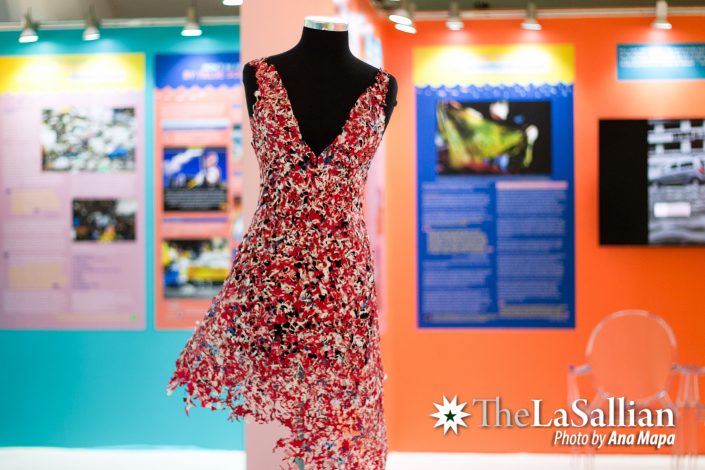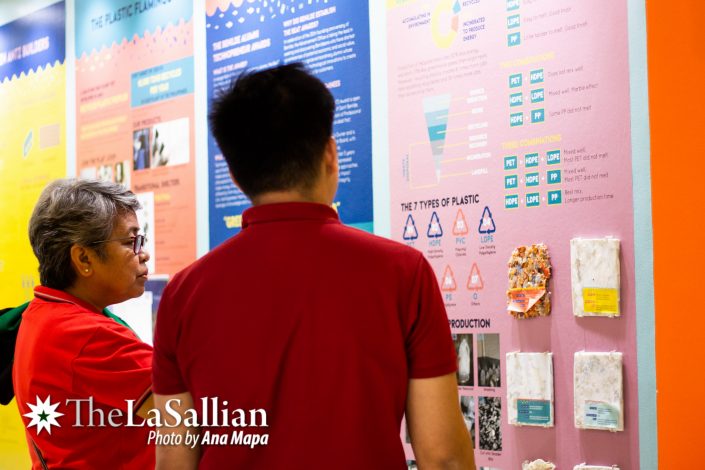The Philippines is the third-largest plastic waste polluter—contributing six percent of the world’s total share of mismanaged plastic waste—only behind Indonesia and China’s 10 and 28 percent, respectively. These are alarming figures, as plastic materials are unsustainable from their creation to their disposal.
Marine animals can mistake plastic wastes for food, such as in the case of a Cuvier’s beaked whale who, after swallowing an estimated 40 kg of marine plastic waste, ended up dead on the shores of Compostela Valley in Mindanao last March 2019.
In an effort to encourage discourse on the matter, the Center for Campus Art (CCA) from De La Salle-College of St. Benilde (DLS-CSB) hosted the Alon! exhibit from August 30 to December 14 last 2019, at the 12th floor of the School of Design and Arts (SDA) building. Utilizing visuals like photographs and videos, the exhibit focused on surfers—who are referred to as “eco-warriors”—who regularly manage plastic wastes within their respective coastal regions in the country.
Alon! also showcased other pieces and displays like TrashLation, a photographic reflection which debuted in 2016 that hones in on plastic waste generation, and MealMarket, which drew inspiration on mealworms that are capable of breaking down plastics to produce waste fertilizer and carbon dioxide.
Director and curator of the CCA Gerry Torres shared his inspiration for the exhibit, “When I was reading about the plastic problem, I have to admit that I was ignorant about it. I was blissfully unaware that we have such a problem because we have been trained to look away when it comes to trash.” Torres added, “A part of the exhibit shows successes, such as plastic becoming eco-bricks. We have another student who suggests an alternative for our slippers in Hotel [Benilde].”
A closer look
In conjunction with the exhibit, a documentary film entitled ALON, which was written and directed by Gabby Fernandez and premiered last August 28, was shown at the SDA Cinema. With its tagline “Stop the wave of plastics. Join the wave of change.”, ALON featured six Philippine surfing communities, which includes the Lola Sayong Eco-Surf camp in Sorsogon and the Amihan sa Dahican in Davao Oriental, advocating for the reduced usage of single-use plastics—plastics intended for one-time usage before being disposed of or recycled such as plastic straws and bags.
The film also featured Dr. Wilfredo Licuanan, the director of the Br. Alfred Shields FSC Ocean Research Center, who gave a talk on giving awareness about coastal areas. On his motivation to visit the exhibit, he expounded, “My work as a marine ecologist has led me to realize that the solutions to most of our environmental problems involve behavior [and lifestyle] changes in people, and this requires an increase in awareness and understanding of the issues.”
Actions toward awareness
Last August 2019, DLS-CSB signed a Memorandum of Agreement (MoA) with Manila Mayor Francisco “Isko” Domagoso and Pasay Mayor Imelda Calixto-Rubiano, along with all their respective barangays—including the University’s and DLS-CSB’s areas—to ban single-use plastics. The MoA complements the recent Social Weather Stations survey last month, which found that seven out of 10 Filipinos favored banning the use of single-use plastics across the country.
After the film showing, one of the film’s supervising producers, Robin Serrano, shared that after screening ALON in different La Salle schools in the country, some have acted upon the issue. “Interestingly, banned na ‘yung single-use plastic in [St. Jaime Hilario School—De La Salle Bataan] and in [De La Salle Lipa], bawal na ‘yung polyethylene terephthalate (PET) bottles,” Serrano mentioned.
PET bottles are a type of plastic bottle known to have high chemical, mechanical, and thermal resistance, as well as stability even at higher temperatures and humidity, properties which in turn give soft drinks and water bottles well-rounded durability against instances such as breakage and impact.

However, while PET plastic can be recycled, it remains one of the top waste plastic materials collected in the Philippines, according to an audit in September 2019 by the Break Free from Plastic movement—a global movement that started in 2016 that aims to resolve the plastic waste crisis.
The exhibit not only emphasized the repercussions of the continuous generation of plastic waste, but as well as the practices that contribute to this cycle of waste.
With reports from Ryan Kenneth Lim


